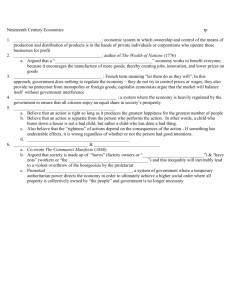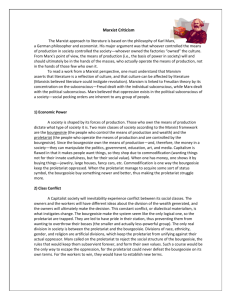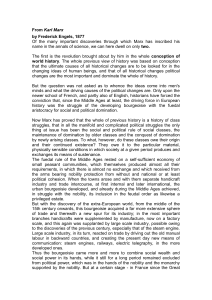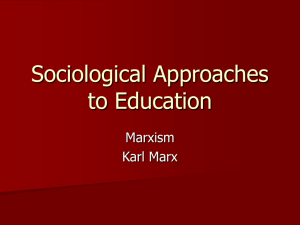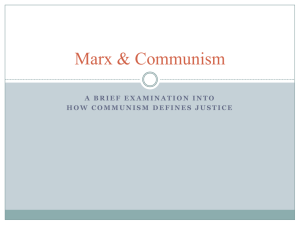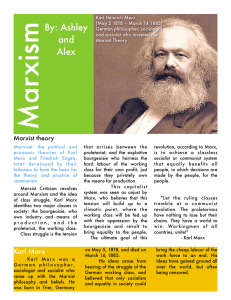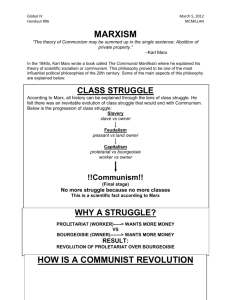Marxist Theory
advertisement
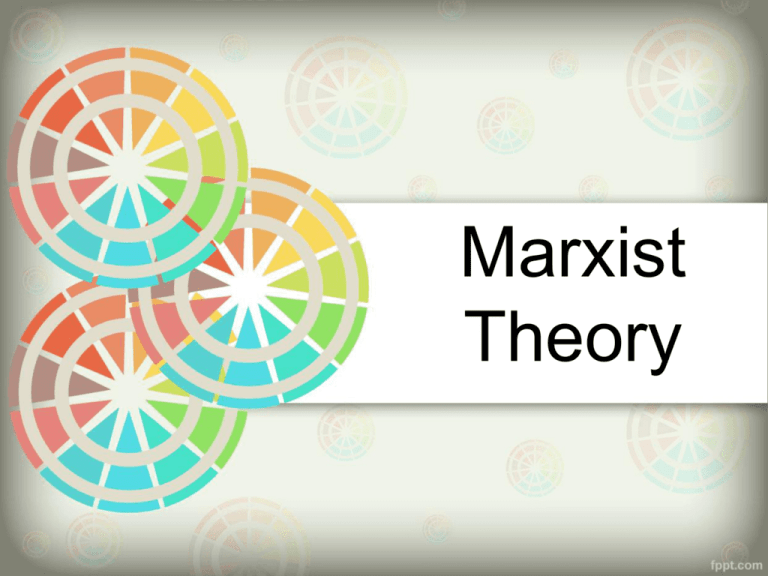
Marxist Theory Marxist Theory The Marxist approach to literature is based on the philosophy of Karl Marx, a German philosopher and economist. His major argument was that whoever controlled the means of production (the factories) in a society controlled the society. Marxist Theory Marx noted a disparity in the economic and political power enjoyed by the factory owners and that allowed to the factory laborers. Marxist Theory He believed that the means of production (i.e., the basis of power in society) should be placed in the hands those who actually operated them. He wrote that economic and political revolutions around the world would eventually place power in the hands of the masses, the laborers. Marxist Theory To read a work from a Marxist perspective, one must understand that Marxism asserts that literature is a reflection of culture, and that culture can be influenced by literature. Marxists believe literature can instigate revolution. Four Main Areas of Study • • • • economic power materialism versus spirituality class conflict art, literature, and ideologies Economic Power • A society is shaped by its forces of production. Those who own the means of production dictate what type of society it is. • The two main classes of society are the bourgeoisie (who control the means of production and wealth) and the proletariat (who operate the means of production and are controlled by the bourgeoisie). Economic Power • Since the bourgeoisie own the means of production—and, therefore, control the money—they can manipulate politics, government, education, art, and media. • Capitalism is flawed in that it creates commodification (a desire for possessions, not for their innate usefulness, but for their social value). Display of material objects is the most common way of showing off one’s wealth. Economic Power • Commodification is one way the bourgeoisie keep the proletariat oppressed. Whenever the proletariat manages to acquire some sort of status symbol, the bourgeoisie concocts a new one; thus, the proletariat continues to struggle, never able to “catch up.” Materialism Vs. Spirituality • Regardless of what some might claim, social values reflect material goals, not abstract ideals. • The material world is the only non-subjective element in a society. Money and material possessions are the same by every measure within a society, whereas spirituality is completely subjective. • The quality of a person’s life is not destroyed by spiritual failure but by material failure. Class Conflict • A Capitalist society will inevitability experience conflict between its social classes. • The owners and the workers will have different ideas about the division of the wealth generated, and the owners will ultimately make the decision. • This constant conflict, or dialectical materialism, is what instigates change. Class Conflict • The bourgeoisie present their political, economic, and social structures as the only reasonable ones. The proletariat, indoctrinated from birth to have pride in their station, are prevented from wanting to overthrow their oppressors (ironically, the smaller and actually less-powerful group). • The only real social division is class. Divisions of race, ethnicity, gender, and religion are artificial, devised by the bourgeoisie to distract the proletariat from realizing their unity and rebelling against their oppressors. Class Conflict • Marx called on the proletariat to reject the social structure of the bourgeoisie, the rules that would keep them subservient forever, and form their own values. Such a course would be the only way to escape the oppression, for the proletariat could never defeat the bourgeoisie on its own terms. For the workers to win, they must establish new terms. Art, Literature, and Ideologies • Art and literature are among the vehicles by which the bourgeoisie impose their value system on the proletariat. The arts can make the current system seem attractive and logical, thus lulling the workers into an acceptance of it. • Works of art and literature are enjoyable, so the audience is unaware of being manipulated. Art, Literature, and Ideologies • The bourgeoisie control most artistic output because, whether through patronage or sponsorship, they are the entity that funds the arts and entertainment. Since the bourgeoisie materially support the writers and the painters—owning the means of production as well as serving as primary consumers—the artist must be careful not to offend bourgeois values. Anything offensive or challenging to the bourgeoisie will simply not be published or sold. • Any artist who wishes to criticize the bourgeoisie must do so in a subtle way (satire, irony, etc.). Essential Questions 1. Who are the powerful people in the text? Who are the powerless? Who receives the most attention? Why do the powerful have the power? Why are the powerless without power? 2. Is there class conflict and struggle? Explain. 3. Is there alienation and/or fragmentation evident in any of the characters? If so, in whom? The powerful? The powerless? Essential Questions 4. Do the powerful in the text suppress the powerless? How? News? Media? Religion? Literature? 5. What can you infer from the setting about the distribution of wealth? 6. What does the society value? Are possessions acquired for their usefulness or their social value?
